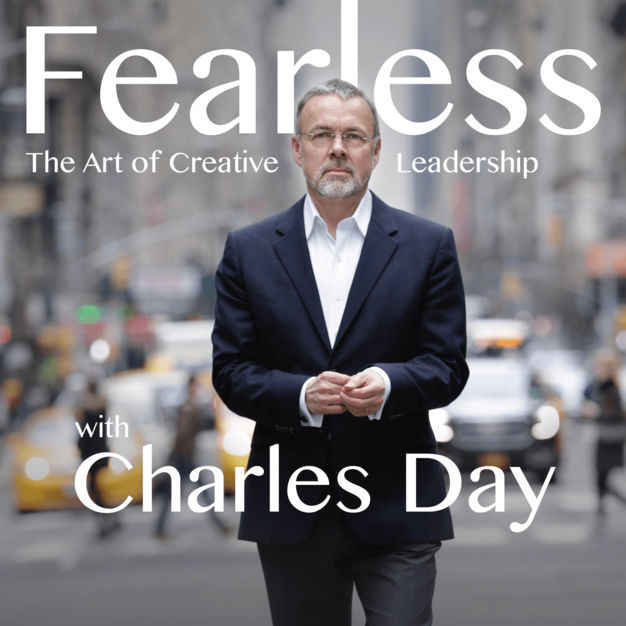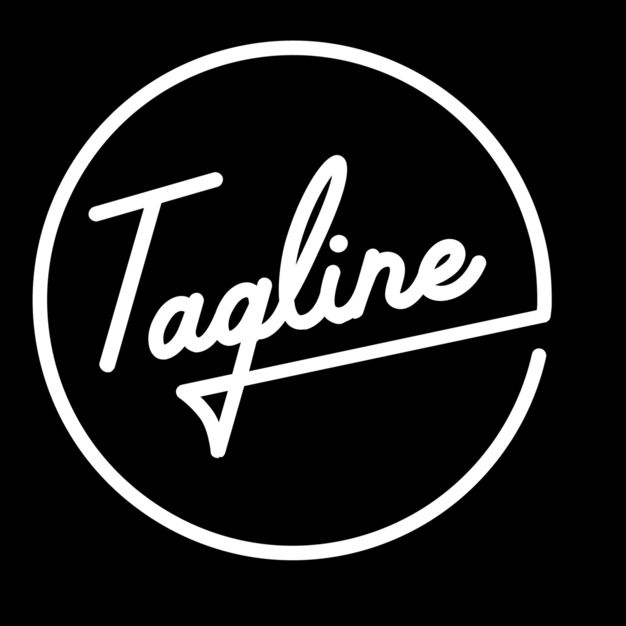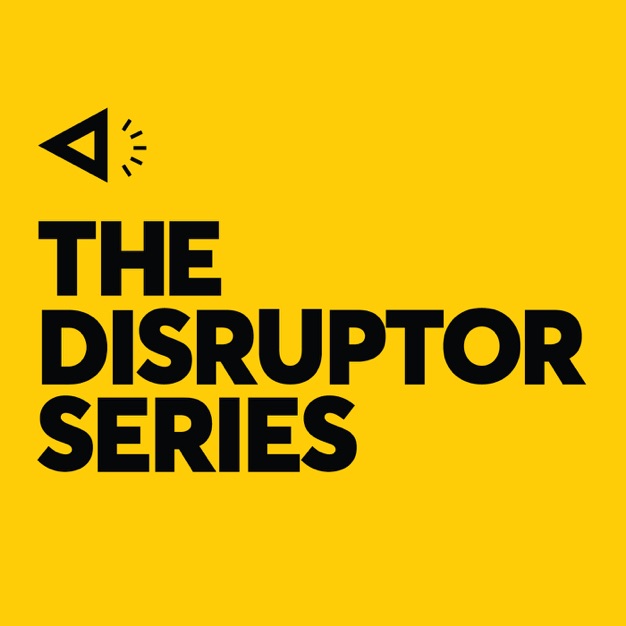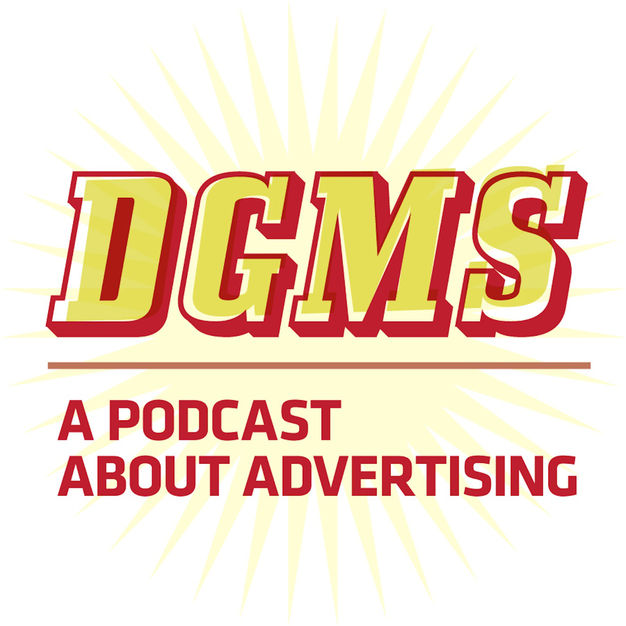
Fearless - The Art of Creative Leadership with Charles Day
Charles Day
We talk to leaders of the world’s most disruptive companies about how they are jumping into the fire, crossing the chasm and blowing up the status quo. Leaders who’ve mastered the art of turning the impossible into the profitable.
- 47 minutes 28 secondsEp 275: Jim Stengel - "The Intentioned Leader"
Who do you trust?
Jim Stengel is the former CMO of P&G, and he's now a hugely successful author, speaker, coach, consultant, and advisor. He's also the host of the brilliant CMO Podcast.
In our conversation, Jim and I started to lay the framework for how we think that leadership is going to have to evolve as the confidence in most institutions, including government, continues to deteriorate.
Being creative on demand is perhaps one of the hardest things that we ask any human being to do. Because every act of creativity requires an emotional leap by its creator.
That's why the best creative thinking usually comes when you have confidence in yourself and trust in the environment around you.
Now, it's impossible for any of us to predict with any certainty what the next four years are going to look like. What's reasonable to expect is that they will not be “normal.” So in these circumstances, it's very likely that some of the people around you are going to feel a lot less safe than they have before. As leaders, creating an environment that people can trust, regardless of what's going on in the world, will be more critical than ever before. And that starts with giving people reasons to trust you.
Establishing trust is a simple equation. Say what you mean, then do what you say, and do it consistently.
So what do you stand for? And what will you stand for when the chips are down, and the pressure is on? Why should people trust you?
Get that right, and I promise you, you'll change your corner of the world for everyone around you.
17 January 2025, 11:00 am - 18 minutes 8 secondsEp 274: How Will The Best Leaders Lead In 2025?
Welcome to the first episode of 2025. A year that promises to be unlike any other on so many levels.
This episode is designed as a provocation, an inspiration, and a roadmap for the leaders of businesses, for whom unlocking creative thinking is critical.
Over the last four weeks, I've talked to 12 exceptional leaders from a diverse set of experiences and perspectives. I've asked them how the best leaders will lead in 2025. From those conversations, I've identified the three leadership practices that will be critical to leaders of creative businesses this year.
10 January 2025, 11:00 am - 37 minutes 10 secondsEp 273: Karl Lieberman of Wieden + Kennedy - "The Non-Conformer"
What does your company reject?
Karl Lieberman is the Global Chief Creative Officer of Wieden + Kennedy. Wieden is a reference point among creative companies in many industries. For almost 45 years, they'd been impacting culture and driving business for their clients by unlocking the creativity of their people. .
Creating the kind of environment in which people feel safe to put all their ideas on the table is the easiest thing to aspire to. And the hardest thing to do, in my experience.
It means giving people a voice. It means being open, genuinely open to another way of looking at the world. And to the possibility that being criticized is much more desirable than being ignored.
These criteria are at best challenging for most leaders to accept. Control and predict are much more natural. But predictability and conformity are creative kryptonite.
To unlock creativity and unleash its power to maximum effect, you have to be willing to break the norms, to encourage the irrational and sometimes even the absurd.
You have to reject predictability for possibility.
And when you're yelled at, because no one has ever done it like that before, you have to be willing to shrug.
You'll hear all that and more in my conversation with Karl.
4 December 2024, 11:00 am - 45 minutes 53 secondsEp 272: Lina Polimeni of Eli Lilly and Company - "The Big Dreams Leader"
What are you willing to compromise?
Lina Polimeni is the Chief Corporate Brand Officer at Eli Lilly and Company. This is a business whose work is often the difference between life and death, where they are trying to cure cancer, and where the outcome is very personal.
In the middle of that reality, your own leadership journey is fueled by a lot of food for thought.
No one can lead effectively without compromise.
But what we choose to compromise has a huge part to play in whether we’re successful.
If what we end up sacrificing is a pathway to discovering that we are already enough… If what we end up sacrificing is a road to realizing that the best version of who we are can help others become the best version of themselves…
If that is what we are compromising, then the cost of that will be the realization that we behaved as others wanted us to. And when they are a part of our past, remembered or forgotten, what we will be left with is a journey that is not the one we started out on. A destination that is not where we wanted to go. And a dream that is always around the corner.
We can be what others want, or we can be who we want to be. We always have that choice.
6 September 2024, 10:00 am - 23 minutes 10 secondsEp 272: Lina Polimeni - In 23
Edited highlights of our full length conversation.
What are you willing to compromise?
Lina Polimeni is the Chief Corporate Brand Officer at Eli Lilly and Company. This is a business whose work is often the difference between life and death, where they are trying to cure cancer, and where the outcome is very personal.
In the middle of that reality, your own leadership journey is fueled by a lot of food for thought.
No one can lead effectively without compromise.
But what we choose to compromise has a huge part to play in whether we’re successful.
If what we end up sacrificing is a pathway to discovering that we are already enough… If what we end up sacrificing is a road to realizing that the best version of who we are can help others become the best version of themselves…
If that is what we are compromising, then the cost of that will be the realization that we behaved as others wanted us to. And when they are a part of our past, remembered or forgotten, what we will be left with is a journey that is not the one we started out on. A destination that is not where we wanted to go. And a dream that is always around the corner.
We can be what others want, or we can be who we want to be. We always have that choice.
6 September 2024, 9:59 am - 41 minutes 54 secondsEp 271: Kerry Sulkowicz of Boswell Group - "The Psychoanalyst"
Are you centered?
Kerry Sulkowicz is the Past-President of the American Psychoanalytic Association, and the Founder and Managing Principal of Boswell Group. They provide leadership advice to boards and CEOs.
Kerry and I have been friends for a long time, and he has taught me much about the psychodynamic aspects of leadership. Whenever we talk, his advice strikes me as clear and straightforward, and always very human.
Being centered doesn’t happen through accident, chance, or hope. It happens by intent.
And that intent is driven by recognizing two obvious truths.
Leadership is lonely.
And leadership is stressful. Much, much more so than many are willing to admit publicly.
The old-world view is that leadership demands that you project strength, certainty, invincibility. Even in the face of threats that can feel like they are existential - because these days, for many businesses, they might be.
If some days that means you feel like you’re a leader in a fight for survival, well, that’s not surprising. Because that’s exactly how your brain responds to that set of circumstances.
And under that kind of stress, the part of your brain that’s responsible for executive function, for risk assessment, and problem-solving, and for planning, suddenly starts to develop tunnel vision. And at the same time, our amygdala kicks in and suddenly survival gets added to the emotional maelstrom, and then finally comes the impulse to hurry up and do something. Anything.
Being centered is the shelter in that storm. It’s held up by a strong sense of self, by awareness and honesty about how you respond under stress, and it’s helped by having a clear and multi-faceted definition of success.
Those foundations, when combined with a willingness to take a little time to turn down the short term noise, and dilute the adrenaline fueled feelings of urgency, will give you the ability to lean on yourself and think things through.
Leadership is sometimes about taking action and it is sometimes not.
But it is always about being centered.
So, how well do you know yourself?
30 August 2024, 10:00 am - 21 minutes 41 secondsEp 271: Kerry Sulkowicz - In 21
Edited highlights of our full length conversation.
Are you centered?
Kerry Sulkowicz is the Past-President of the American Psychoanalytic Association, and the Founder and Managing Principal of Boswell Group. They provide leadership advice to boards and CEOs.
Kerry and I have been friends for a long time, and he has taught me much about the psychodynamic aspects of leadership. Whenever we talk, his advice strikes me as clear and straightforward, and always very human.
Being centered doesn’t happen through accident, chance, or hope. It happens by intent.
And that intent is driven by recognizing two obvious truths.
Leadership is lonely.
And leadership is stressful. Much, much more so than many are willing to admit publicly.
The old-world view is that leadership demands that you project strength, certainty, invincibility. Even in the face of threats that can feel like they are existential - because these days, for many businesses, they might be.
If some days that means you feel like you’re a leader in a fight for survival, well, that’s not surprising. Because that’s exactly how your brain responds to that set of circumstances.
And under that kind of stress, the part of your brain that’s responsible for executive function, for risk assessment, and problem-solving, and for planning, suddenly starts to develop tunnel vision. And at the same time, our amygdala kicks in and suddenly survival gets added to the emotional maelstrom, and then finally comes the impulse to hurry up and do something. Anything.
Being centered is the shelter in that storm. It’s held up by a strong sense of self, by awareness and honesty about how you respond under stress, and it’s helped by having a clear and multi-faceted definition of success.
Those foundations, when combined with a willingness to take a little time to turn down the short term noise, and dilute the adrenaline fueled feelings of urgency, will give you the ability to lean on yourself and think things through.
Leadership is sometimes about taking action and it is sometimes not.
But it is always about being centered.
So, how well do you know yourself?
30 August 2024, 9:59 am - 47 minutes 44 secondsEp 270: Taban Shoresh of The Lotus Flower - "The Refugee"
What is your pain for?
Taban Shoresh is the Founder of The Lotus Flower, a UK-based charity that supports women and girls that have been displaced by conflict, and helps them to build sustainable futures. Since 2016, the charity's projects have impacted more than 60,000 women, girls, and community members.
Every now and then, you meet someone whose story stops you in your tracks. Taban’s story starts with her being arrested in Iraq at the age of four. Three weeks later, she's ordered onto a bus that will take her to the place where she and other members of her family will be buried alive.
At the end of 2021, before Russia invaded the Ukraine or the war in Gaza, the number of forcibly displaced people worldwide stood at 89.3 million. There were 27.1 million refugees globally, half of whom were aged under 18, which makes Taban's story one of millions and completely unique.
She has experienced staggering trauma, she has known realities that I'm sure I would not have survived, and she has taken all of that pain and turned it into creative leadership of the most consequential kind. As you'll hear, for reasons both global and personal, she's in a hurry.
All of us have suffered pain. What we use it for is a question that will stay with me for a long time after this conversation.
23 August 2024, 10:00 am - 24 minutes 48 secondsEp 270: Taban Shoresh - In 24
Edited highlights of our full length conversation.
What is your pain for?
Taban Shoresh is the Founder of The Lotus Flower, a UK-based charity that supports women and girls that have been displaced by conflict, and helps them to build sustainable futures. Since 2016, the charity's projects have impacted more than 60,000 women, girls, and community members.
Every now and then, you meet someone whose story stops you in your tracks. Taban’s story starts with her being arrested in Iraq at the age of four. Three weeks later, she's ordered onto a bus that will take her to the place where she and other members of her family will be buried alive.
At the end of 2021, before Russia invaded the Ukraine or the war in Gaza, the number of forcibly displaced people worldwide stood at 89.3 million. There were 27.1 million refugees globally, half of whom were aged under 18, which makes Taban's story one of millions and completely unique.
She has experienced staggering trauma, she has known realities that I'm sure I would not have survived, and she has taken all of that pain and turned it into creative leadership of the most consequential kind. As you'll hear, for reasons both global and personal, she's in a hurry.
All of us have suffered pain. What we use it for is a question that will stay with me for a long time after this conversation.
23 August 2024, 9:59 am - 49 minutes 1 secondEp 269: Heather Freeland of Adobe - "The 'Is That Good?' Leader"
Is that good?
Heather Freeland is the Chief Brand Officer at Adobe, a business that, as Heather describes, is undergoing significant change to prepare itself for the future to come, and the one that is already here.
In a company long known for providing powerful tools to creative people, the advent of Generative AI is both a threat and an opportunity. How human beings maintain our relevance sits at the very heart of that tension.
Is that good?
In the quest to become leaders that make a difference, there are many powerful questions to ask ourselves.
What do I want to find out about myself?
What is success?
Both of these are intensely personal, and can be answered, albeit with some serious and honest reflection, from within.
But, “Is that good?” usually stretches us out into the world. We are inclined to ask, through what lens? Against what criteria? Measured by what result? Based on whose experience?
But at the end of that journey of data collection, consultation, and analysis, the answer to, “Is that good?” is still waiting for someone to decide.
Michelangelo, when asked how he had created such perfection from a piece of rock said, “I simply removed everything that wasn’t the David.”
If human beings are to create a dividing line that AI can not cross, the question, “Is that good?” may be the beating heart on which that barrier depends.
“Is that good?” is heavy lifting. It requires clarity and confidence.
Muscles we should probably start building today.
16 August 2024, 10:00 am - 25 minutes 44 secondsEp 269: Heather Freeland - In 25
Edited highlights of our full length conversation.
Is that good?
Heather Freeland is the Chief Brand Officer at Adobe, a business that, as Heather describes, is undergoing significant change to prepare itself for the future to come, and the one that is already here.
In a company long known for providing powerful tools to creative people, the advent of Generative AI is both a threat and an opportunity. How human beings maintain our relevance sits at the very heart of that tension.
Is that good?
In the quest to become leaders that make a difference, there are many powerful questions to ask ourselves.
What do I want to find out about myself?
What is success?
Both of these are intensely personal, and can be answered, albeit with some serious and honest reflection, from within.
But, “Is that good?” usually stretches us out into the world. We are inclined to ask, through what lens? Against what criteria? Measured by what result? Based on whose experience?
But at the end of that journey of data collection, consultation, and analysis, the answer to, “Is that good?” is still waiting for someone to decide.
Michelangelo, when asked how he had created such perfection from a piece of rock said, “I simply removed everything that wasn’t the David.”
If human beings are to create a dividing line that AI can not cross, the question, “Is that good?” may be the beating heart on which that barrier depends.
“Is that good?” is heavy lifting. It requires clarity and confidence.
Muscles we should probably start building today.
16 August 2024, 9:59 am - More Episodes? Get the App
Your feedback is valuable to us. Should you encounter any bugs, glitches, lack of functionality or other problems, please email us on [email protected] or join Moon.FM Telegram Group where you can talk directly to the dev team who are happy to answer any queries.
 Real Famous
Real Famous
 Tagline
Tagline
 Disruptor Series
Disruptor Series
 Talking to Ourselves
Talking to Ourselves
 Don’t Get Me Started
Don’t Get Me Started